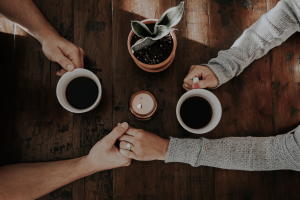The Importance of Tradition
 Candles lit on the dining room table, chatter of grown-ups talking, peals of laughter echoing through the house, the delicious scent of potato pancakes frying in the kitchen where my mother and grandmother stand over the hot stove…
Candles lit on the dining room table, chatter of grown-ups talking, peals of laughter echoing through the house, the delicious scent of potato pancakes frying in the kitchen where my mother and grandmother stand over the hot stove…
I remember being 7-years-old, wearing a party dress with wool tights and shiny black Mary Janes. It is Hanukkah, the Jewish festival of lights. Everything feels special, and it seems all is right in the world. Like a mother smoothing a baby’s blanket, peace settles over my heart. These are the memorable holiday moments for a little girl. It is through such experiences that we learn who we are, based on innocent discoveries of where we came from. As that little girl at those gathering, I closely observed my aunts and uncles, my grandparents, and my own parents, feeling, albeit unconsciously, a profound connection to relatives who came before me and the link to their ancestors: my mother’s mother, my father’s father and those who came before him.
Understanding that I do not live in a vacuum, that this period of time is connected to all other periods of time — those that preceded me and those that will come after — I become part of something larger than myself, part of the eternal mystery, taking my place in the fabric of life itself. It is during the holidays that our unique cultural traditions have the greatest potential to help in this process of self-definition, to contribute to well being, and to cultivate an all-important sense of belonging and a healthy perspective of our place in the world.
Fiddler on the Roof is the story of a Russian family forced to flee their homeland. In the song Tradition, Tevye, the wise father, says that without our traditions, the community of mankind would lose its grounding. “Because of our traditions,” Tevye sings, “we’ve kept our balance for many, many years … and because of our traditions, every one of us knows who he is and what God expects him to do.”
Our traditions act as a compass for all of our human relationships and personal interactions, the qualitative experiences of our family life, and ultimately, the development of civilized societies themselves. As we honor traditions, so we learn to honor ourselves, and in the final analysis, each other.
What makes something a tradition is that it is handed down from one generation to the next, creating a living, dynamic flow of rhythm and predictability — like the girl in the kitchen watching her mother and grandmother cook, discerning how to take her place within a meaningful legacy. It is critical for children to be a part of family traditions. It connects them to that greater whole and leads to heightened empathy, a more fulfilling happiness and engaged citizenship. In the same way that composer Leonard Bernstein described the composition of music as “one note that follows another with complete inevitability,” we count on traditions, like a melody, for that dependable and predictable outcome. While filmmaker Woody Allen points out that tradition gives us only “the illusion of permanence,” predictability gives us comfort in an otherwise shaky, unknowable world.
Marriage, Sunday football, Halloween, religious holidays, birthdays, anniversaries, and graduations — there is little that is not tradition when it comes right down to it. Yet, while we hold old traditions dear, it can be dangerous and downright dogmatic to eschew new ways of looking at things in the name of grasping after traditions that have become outlived. We must be all the while open to the creation of new ones. As author and lecturer Ardis Whitman wrote, “We must cherish our yesterdays, but never carry them as a burden into the future. Each generation must take nourishment from the other and give knowledge to the one that comes after.”
We desperately need our traditions. Part of the responsibility of having the chance to live at all — should we choose to look at it that way — is to be a part of the transmission of our particular family and ethnic customs. In so doing, we honor past generations by passing on their rites and rituals to the next generation. In this way, our family lineages stay stable and strong. Since ceremonies outlive us, they make us feel part of that larger sense of things as we pass them down to our own children, and theirs. That is how we realize our immortality — not in living forever, but in being part of living traditions. And without them, perhaps Tevye is right. “Without our traditions,” Tevye writes, “our lives would be as shaky as…a fiddler on the roof.”
Flash back several years. I am visiting my grandmother in her Miami Beach apartment. The sun has set on a clear December night, and we are sitting in her kitchen grating potatoes and talking about her life back in Russia, before she escaped the same life Tevye had lived and made her way to America. My grandmother’s hair is grey, styled in a bun. I am a freckle-faced college student. I watch her take eggs, matzo meal, potato gratings and seasoning and form the mixture into pancakes. Oil sizzles on the hot stove behind us. Aware of my role in the arch of experience, I watch my grandmother and learn. Tradition.
Grandma Regina’s Potato Pancakes
Ingredients
4 large potatoes
1 small Vidalia onion
1 egg, beaten
1 teaspoon salt
2 tablespoons matzo meal or all-purpose flour
ground black pepper to taste
2 cups canola oil for frying
Directions:
Grate potatoes and onion into a large bowl. Drain off excess
liquid. Soak up extra liquid by taking layers of paper towel
and pressing down on potato gratings. Throw out paper
towel.
Mix egg, salt, and black pepper into grated potatoes and onion. Add 2 to 4 tablespoons of matzo meal or flour to make mixture thick.
Heat oven to 200 degrees F (95 degrees C).
In the bottom of a heavy skillet or frying pan, heat 1/4 inch oil over medium high heat. Place two or three 1/4 cup spoonfuls of potato mixture into the hot oil, and flatten to make 1/2 inch thick pancakes. Fry until golden brown, tuning once.
Drain on paper grocery bags. Salt to taste. Repeat until all potato mixture is used. Keep pancakes warm in low
oven.
Serve with applesauce and sour cream.
This first appeared in Ambassador Magazine, Detroit, Michigan.
Tags: family, family relationships, holidays, tradition








Poggers
nice